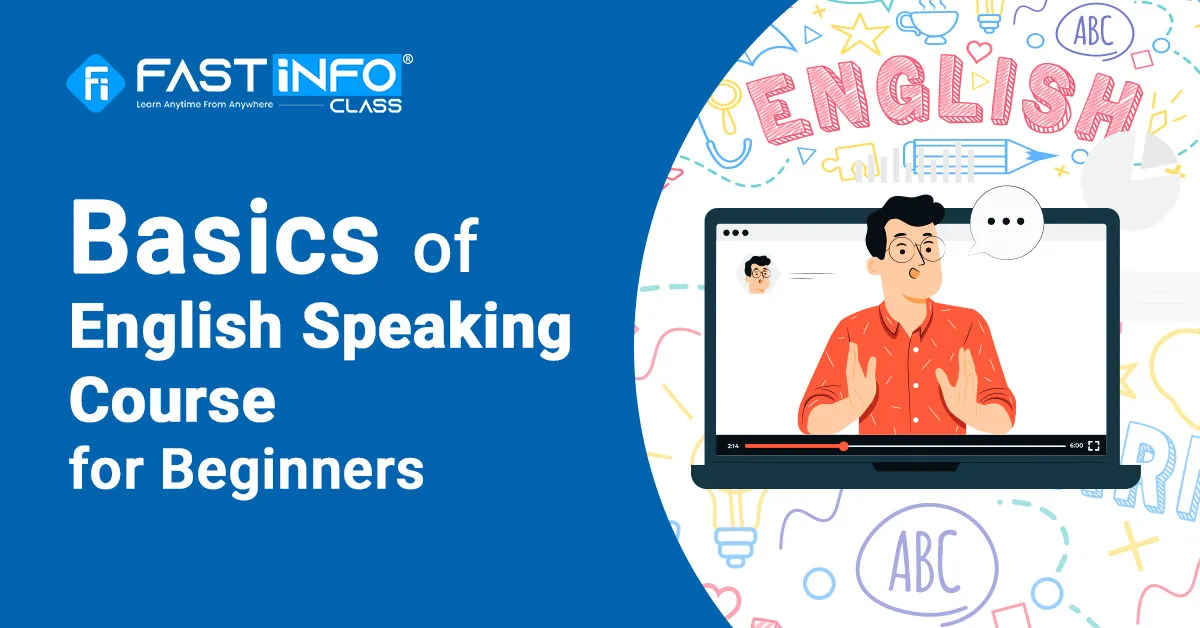Top 10 IELTS Coaching Centres in India
04 Jun, 2025

 By FastInfo Class
Published On 23 Aug 2024
Updated On 12 Dec 2024
Category Spoken English
By FastInfo Class
Published On 23 Aug 2024
Updated On 12 Dec 2024
Category Spoken English
If you are not a native English speaker, you need to learn spoken English. It does not mean that you have to learn English like a professor. Most of the non-native speakers who talk in English do not have enough grip over English. They know small and easy spoken English sentences. They can make conversation with others. If you learn small sentences for each situation you face every day, you will be able to speak in English and converse easily with others. You can also understand the English that others speak, as you know the spoken terms of what they might say.
If you learn the small sentences to communicate with a person for the first time, the sentences used for the first day at the office or workplace, what to say in front of a shop, what to speak while purchasing something, speaking with the boss of the office, and other situations, you will learn how to speak in English.
When you are in front of an interviewer, you have to impress him with your tricky replies, sober words, and process-related knowledge. The first impression you make will last forever. To make your first impression, you must learn spoken English very carefully. If you are not accustomed to speaking fluently, and have fewer words in stock; you can still speak in English and make a good first impression on the interviewer. By following some tricks for reminding spoken English sentences, you can flawlessly speak English in any situation you want to face.
You must speak English with easy and common words. In everyday life, nobody speaks critical language in their mother tongue. Everybody uses simple sentences, simple questions in different situations, and so on. L.A. Hills also mentions speaking in simple English by using simple sentences without any jargon, idioms or ambiguous words.
Some simple sentences and questions can be game changers for speaking English fluently. Let’s learn them step by step.
What is a Simple Sentence?
A simple sentence starts with a subject and a predicate (from the verbs to the rest of the sentence). No complications in construction are available in these sentences. You must not use any connectors, relative pronouns, conjunctions, and so on. Depicting something in a few simple words with simple construction helps a lot to avoid critical mistakes where you cannot detect the mistakes. However, during conversation, nobody uses a critical or complicated sentence in their mother tongue. So, why are you thinking that when you speak English, you have to use critical and complicated sentences? The fear in your mind restricts uttering any word from your mouth when you try speaking English.
Let’s learn some simple processes to form easy sentences. However, before entering this session, you have to learn “Parts of Speech” clearly. Without knowing parts of speech it would be critical to follow the way I am going to discuss the form of simple spoken sentences.
Let’s have some discussion on parts of speech:
Parts of speech are nothing but each part of a sentence. If you mention a sentence: “He gave me a very nice pen yesterday at home,” you will get a lot of parts in the sentence. Here,
He gave me a very nice pen yesterday at home.
He—Subject (Noun/Pronoun)
Gave—verb (past form)
Me— (Indirect Object/IO)
A— (article/adjective)
Very— (adverb)
Nice— (adjective)
Pen— (DO/ Direct Object)
Yesterday— Adverb
At— preposition
Home— Adverb.
Again, when you judge a sentence, “Hurrah! We have won the match.”
In this sentence,
Hurrah—Interjection
We— Subject
Have— Auxiliary verb
Won (verb-past form)
The- article
Match-Object
You have to learn all the parts of speech so that you can implement correctly the entire parts of speech. If you are not accustomed to utilizing the parts of speech, you will not be implement an easy sentence contraction process or rule implementation. If you are not accustomed to doing so, you can contact the top organizations where you will get all the grammar ideas to implement them. Then, you can use all parts of speech in your spoken English sentences.
Here are some easy tips for framing sentences easily:
SVO
SVA
ASVO
SVIODO
SVC
ASVC
SVOC
SVAA
Let’s learn how this formula works for learning or framing sentences for using them in daily life.
SVO- Subject+ Verb+ Object
He plays football
He does his duty
They dug a pond
SVA- Subject+ Verb+ Adjunct
This formula is to form a sentence with a subject, then a verb, and at last, you have to put an adjunct part.
He goes to school.
They are going to Kolkata.
He speaks in English.
ASVO- Adjunct + Subject + Verb + Object
Last week, we watched a movie.
Today, I’ll join the meeting.
SVIODO- Subject+ Verb+ Indirect Object+ Direct Object
My grandfather gave me a pen. (Me-IO, A pen-DO)
Keep in mind that IO and DO must be placed in this way, otherwise, the use of prepositions will appear in between and will form a prepositional object. (My grandfather gave a pen to me).
SVC- Subject+ Verb+ Complement
Mr. Ritesh is our chairman. (“Chairman” is the complement of Mr. Ritesh)
SVOC- Subject+ Verb+ Object Complement
They selected me as a team leader.
We Made Him Captain.
(“captain” is the complement of the object “him”. Captain is not an object. Keep it in mind. This information is highly essential when you go for transforming it into a passive voice. Complement cannot be used as an object!)
ASVC- Adjunct+ Subject+ Verb+ Complement.
Previously, Mr. Roy was a captain.
At the time, Asoka was a king.
SVAA- Subject+ Verb+ Adjunct+ Adjunct
We meet every weekend at the park.
They have been living under the tree for ages.
These are the basic sentence structures that you have to learn while trying to speak in English. These simple structures will be helpful to frame any sentence either spoken terms or written terms.
The next step is to learn the tenses of verbs:
You know tenses are an essential part of learning spoken or written English. Without the knowledge of tense, you cannot speak a sentence. Then, you may want to express something, and people will understand another thing.
What happens if you use the wrong tense? You may face the following issues:
If you want to express, something in the past tense and said in future tense, the people will understand it and will create a critical issue. If you say, “I shall go home” in place of “I went home”, only English-known people will understand what happens then!
So, learn to utter the event in the correct tense and time.
The next step is to learn to form interrogative sentences, negative sentences, and imperative sentences. These are the most vital sentence structures that you must learn to speak in front of others. When you speak, you ask something. It is an interrogative or questioning sentence, when you disagree, you express it in negative sentences, and when you want to ask something or order, you use an imperative sentence. So, these sentences are essential.
Interrogative Sentence:
Formula:
AV+S+O/A (auxiliary verb+ subject+ object or adjunct)
Statement: He is playing football.
I.S.: Is he playing football?
I.S.: Are you having a meal?
Wh.-word+ AV+S+O/A (Wh. + auxiliary verb+ subject+ object or adjunct)
I.S.: Where are you going?
Dummy “do” as an auxiliary verb
If you do not have any auxiliary verb in the sentence, you have to bring a dummy “do” as an auxiliary verb. The rest of the part will form similarly in the sentence. This “do” will take the same tense as the verb, but the verb will have no tense (root form or present form).
Vishal plays football.
Does Vishal play football?
He went to school.
Did he go to school?
Now, you have to learn the negative sentence framing to learn Spoken English Sentences. Learn some of them.
Usually, “Not” is used after the axillary verb. If you do not have any axillary verb, you have to use a dummy “do” as mentioned in the interrogative sentence.
He is playing football.
He is not playing football.
He is working hard in the office.
He is not working hard in the office.
He plays football.
He does not play football.
He will finish the project today.
He will not finish the project today.
These are the examples of negative sentences. However, it is a brief discussion. To learn more, you have to be admitted to a reputed organization where you will get a detailed discussion.
Using Imperative Sentence:
Imperative sentence is one of the most useful sentence structures for written and spoken English.
When you want to express order, advice, or request, imperative sentences are used. You can add “please” with the requesting sentences. It is a formal expression to add “please” with a requesting sentence.
The sentence structure is
Here V1 means the root form or present form of a verb.
Here are some examples:
Please, come here. (Request)
Please, don’t make a noise. (Request)
Don’t run in the sun. (Advice)
Please, meet Mr. Ramesh to have a copy of the order.
Visit to the zoo.
Learn till death
Please, don’t move. Otherwise, the injection syringe may enter the wrong direction.
Let me do it. [Let v1 + IO+ V1+ (DO)]
In this way, you can frame imperative sentences. It is part and parcel of learning spoken English. These sentences are simple by nature.
Learn Spoken English Sentences for Meaningful Conversations:
When you are in front of an HR for an interview, you have to pay attention to what you say. Keep in mind that you have to impress them with your spoken terms. 90% of interviewees know their work well, but most of them get rejected for their spoken English capability.
A person is remarked on and remembered by their character and what they say in front of people. It is also a part of behavior. So, here are a few tips on how to make meaningful conversations with others. If your mother tongue is not English, you need to contact the best learning center where you can learn it very proficiently. Learn how to simply start a conversation where your confidence will remain intact and the language will remain flawless.
Before you start a conversation, you have to keep in mind the person you are going to speak to. When you are with your friends, it will be gossiping; when you are with your boss, it will be some formal questions and answers, and when you are in front of your recruiting HR, you have to learn some specific sentences that they usually ask. Know your job, hobby, and yourself, and prepare yourself through multiple assignments.
Customer service points require problem-solving procedures or have to sell some products. So, you have to learn by heart the detailed procedure to convince your customer. For a sales job, you must sell all day long, and you have to pitch and promote your product or service.
Keep confidence in all conversations, whenever you speak with someone. Use simple words when you speak something.
If anybody offers something and you need it, you can thank them. If you do not need it, you can deny it by saying, “No I did not need it. Thank you”.
When you seek something, you can use simple words like, “I want this…”
Examples of Simple English Sentences
Here, you will get some simple sentences that are essential in almost all conversations based on different situations. Here, you will find some simple sentences to understand how only a few simple Spoken English Sentences can handle and manage the entire situation.
Introducing yourself in the first meeting:
You may have a lot of situations when you meet unknown or known people. You can introduce the first meeting like the following:
Simple English Sentences to Introduce Yourself
Hi, I am or this is (your name). I recently joined this company. You can also say, “I recently moved to your neighborhood flat." I live in room number 14. What is your name? Or, you can say, “Your name, please." Nice to meet you. (You have to select wherever these sentences are meaningful and essential in different situations, like in front of an interviewer, colleague, or neighbor.)
You can ask any time his/her name, “May I know your name?”
You can start your conversation with:
Good morning, afternoon, evening, etc. Then tell your name, my name is (Name), I am new in this area/flat/office. May I know your name? I am searching for a food stall nearby.
I just joined the office as a designer/developer/programmer. My name is (Name), and you? Ask him/her name after informing your name individually. “What is your name?”
You can start your conversation with "hello." So, you can start like, “Hello, I am (name); I am your new neighbor. May I know your name?
Hello, everyone, I have joined here as a web designer (or anything). Would you please introduce all of you?
Or when you are a bit older in the company or a senior in a team, you can say, “Hello everyone, let’s go for a briefing now.”
You can start a short conversation with a "hello." Even you can start a conversation with someone unknown to you with, “Hello.”. It makes it easy to converse with others and grab attention. However, ‘excuse me” is the most common phrase for grabbing the attention of others.
So, keep in mind that “hello” is the word for starting a short conversation, or regular conversation.
Good morning, evening, afternoon, etc. are the starting of conversation when you are meeting someone for the first time in the day.
Hey, how do you do? How is the day? I hope you are doing well.
Hi! What’s your plan this weekend?
How have you enjoyed the weekend?
The weather is great today.
Use a questioning sentence for asking something to someone.
Where are you going?
How long will it take to complete the project?
What is your next plan?
Which way have you to do now?
What is the cost of the TV/Mobile?
How much does it cost?
If you want to learn about the location of someone, you may use spoken English sentences as follows:
Over Phone:
Where are you right now?
Where is Anita? She is not in the seat!
Where would you like to go?
Where are we going now?
Where is the pen?
Where from are you coming? – This sentence may also be asked to know the location where someone is living.
If you want to find someplace, you can use the following sentences:
Good afternoon/morning, Can you please tell me where Victoria's memorial is?
To which way do I have to go now to get to ABC Lane?
Could you please tell me the house number 15C/1 Delhi Road?
Hey there, I am new here. Could you please tell me how I could reach Beacon Street from here?
Asking for Help
Hello sir, could you please help me with the book?
Hello ma’am, can you please pluck my eyebrow (in your spa center)?
Excuse me, sir, could you tell me the next train to Ahmedabad?
It seems to me ambiguous, can you make it clear to me?
Inquiring about Something or Someone
If you want to get information about someone or something, you can use the following spoken English sentences.
Hi Ma’am, Could you please show me the nearest ATM counter?
Hey, could you please tell me the cabin of Mr. . Roy (or any name of a person)?
I want to pursue the course; can you please provide me with the details of the course? I also want to know the fee structure of the course, including the admission fee and annual fees.
Excuse me (Grabbing attention from someone), “Could you tell me the nearest charging station, my vehicle has run out of charge?”
Do you know how to remove the background of the photo (working with someone with a Photoshop application)?
How can I file IT returns? If you do, please help me a bit.
Offering Help
When you want to support someone or offer help to others, you can use the following sentences:
Basic spoken English sentences to offer help:
Hey, isn’t your car not starting? Do you need my help?
Sir, the software installation seems to face some errors. Can I try a bit? I know very well how to do it.
Good morning/afternoon/evening sir, Would you like me to help serve the dish?
Don’t worry, ma’am; we are here to help you learn how to run the machine. Can we start?
Hello sir, can I help move the sofa?
Asking for direction:
You can learn a few spoken English sentences to learn/ask for directions. Here are a few instances:
Excuse me, sir, could you please inform me of the address (showing an address)? Or you can also say, “Could you please show the direction of the address or 26/A Park Avenue, or any other address?”.
Hi, I am looking for this address. Can you help me?
Could you please inform me of the direction of the ABC office?
Hello sir, is there any stationary shop nearby?
Hello ma’am, I am new to Capri. Could you brief me on the beautiful areas here?
Excuse me, sir, Mr. Agarwal has been living in this apartment for 3 years. Probably, they have been shifted. Could you please tell me where they have been shifted?
Hey there, could you please tell me the direction of the little girl, She has run out of the house.
Towards the End of a Conversation
Here are a few sentences that you can use in spoken English towards the end of the conversation.
Say goodbye to the listener!
Goodbye friends! Goodbye, Mr. Roy/or any name!
Have a great weekend! See you on Monday!
Thank you for spending some valuable moments with me. Nice to meet you. Goodbye.
Thank you so much for helping me. Let’s go to bed. Good night.
Good night, Mr. Roy!
Keep in mind that good night is used not to warm welcome to anybody at night, it is the concluding, ending, or end wishing to be separated at night when they will not meet again at night.
By following these simple tricks, you can speak English with confidence even when you do not know English properly or do not have enough stock of words in you. If you follow the tricks of remembering all these spoken English sentences, you can speak in English without much practice. Still, if you want to learn more such sentences or go through a professional spoken English course, you can contact FastInfo Class.
Frequently Asked Questions (FAQs)
Q1. What is a simple sentence?
In this context, a simple sentence is what you use simply to others to express your requirement, ask for support, or know something.
However, in grammar, a simple sentence only has a subject and a predicate. These sentences will not depend on any other clauses or add subordinate clauses with them.
Q2. Give some examples of simple sentences.
Here are some examples of simple sentences:
My name is Ramesh. (Subject is “my name," “is Ramesh” is a predicate)
Q3. How to learn easy English?
Learn grammar, improve your stock of words, and practice speaking every day. Join FastInfo Class to learn the fastest spoken English.
Q4. How can I learn corporate spoken English?
You must learn the sentences regarding corporate English at home. However, you can take admission at FastInfo Class to learn professional spoken English.
Q5. Can I get a higher package if I learn spoken English?
Yes, you can get a higher package in your professional field if you have fluency in spoken English. Without learning spoken English sentences, your promotion may be postponed.

Top 10 IELTS Coaching Centres in India
04 Jun, 2025

How an English-Speaking Tutor Can Improve Your Fluency?
20 May, 2025

Spoken English Classes Online: Speak with Confidence
19 May, 2025

Mastering Spoken English for Businessmen
15 May, 2025

Why is Spoken English for Business Owners Essential?
29 Apr, 2025

Daily English Conversation Practice for Beginners: 50 Useful Topics
29 Jun, 2023

Must Read Novels to Improve English for Beginners to Advanced
21 Feb, 2023

Top 15 Spoken English Books to Enhance Your Fluency
09 Sep, 2023

English Speaking Course for Beginners - Everything you must know
22 Sep, 2021
.webp)
What are the Benefits of Speaking English Fluently?
27 May, 2021